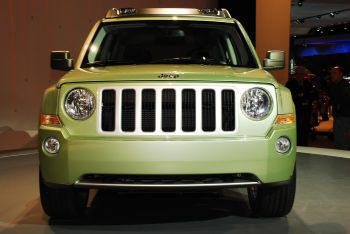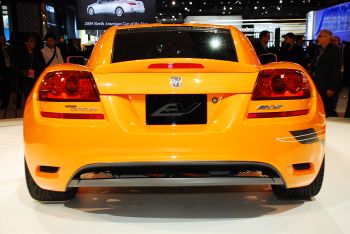

 |
|
Chrysler
presented its current model range at last
month's North American International Auto
Show in Detroit, included in the show
line-up were several proposed electric
vehicles. |
|
|
|
Chrysler
LLC, fighting for its survival, has few options other
than a tie-up with Fiat, Sergio Marchionne, CEO of the
Italian automaker, told the Free Press in an
interview this week. “We can help them,” Marchionne said
during the hour long interview at the Townsend Hotel in
Birmingham. “I haven’t seen a line-up of people at the door
trying to take us out of this deal,” under which Fiat would
take an initial 35% stake in Chrysler and could eventually
own 55% of the company.
Marchionne, who was in town with a team
of about two dozen executives who are studying Chrysler’s
operations as part of Fiat’s due diligence, painted a
picture of a deal that is intertwined with the terms of the
federal loan Chrysler has received from the U.S. government.
First, Chrysler must meet the terms of
the federal loans, present a viability plan and continue to
survive, ultimately to generate cash. “It needs to stand up on its own two
legs,” he said. “If it doesn’t, we won’t play.” He added that care would be taken to
assure that no U.S. tax money went to Fiat.
Marchionne, who was dressed casually in
a black sweater over an open-collared blue dress shirt,
spoke frankly about the challenges facing this potential new
alliance partner. He also referred to himself as a
“blue-collar CEO” who isn’t afraid of rolling up his sleeves
and stressed Fiat’s lack of bureaucracy.
While he acknowledged that the global
auto market is in a dire condition – thanks to a global
economy that he said has “lost all sense of normalcy” –
Marchionne described his vision for a successful alliance
that ultimately could link Chrysler, Fiat and a third
automaker together to become a global automotive powerhouse.
He said the group could sell more than 5 million cars and
trucks a year. For that to be possible, however,
Marchionne stressed it would take “the right level of
concessions” from all the stakeholders, from the UAW to
suppliers and others.
Chrysler currently is owned 80.1% by
Cerberus Capital Management, a New York private equity firm
that has expressed willingness to give up its stake in the
automaker for concessions from bondholders and labour; and
19.9% by Daimler AG, its former German parent. Daimler has
been in acrimonious talks for Cerberus to take its share.
Without Fiat – an automaker that knows
what it’s like to be on the brink of disaster – there is
little chance that another automaker would step in, said
Marchionne, who seemed cautious but optimistic about the
chances for closing the proposed Chrysler-Fiat deal. Marchionne also sought to calm fears
that a foreign entity was about to take over Chrysler or
take money from U.S. taxpayers. The U.S. Treasury has lent
$4 billion to Chrysler and the automaker is seeking another
$3-billion loan. He said there would be “no seepage of
liquidity” between automakers. “Fiat will not take any cash out of
Chrysler not on the basis of the deal that we structured
today, and certainly not until all taxpayer funds have been
repaid.”
The deal includes an option for Fiat to
purchase another 20% of Chrysler for $25 million, pushing
its stake to 55% in the Auburn Hills automaker. That part of
the deal has drawn criticism from some in Washington. Marchionne stressed that it’s not a
given that Fiat would obtain the majority stake in Chrysler.
He described that scenario as being “a long way away.”
Marchionne said it could take as few as
30 months for Chrysler to make vehicles based on Fiat’s
architecture. Fiat vehicles could be imported to the United
States in as soon as a year. A week after Chrysler’s top executives
stressed to reporters at the North American International Auto Show in Detroit
that it is here to stay, Chrysler and Fiat announced the
proposed deal. In return, Chrysler would have access to
nearly all of Fiat’s platforms, allowing Chrysler to catch
up to its domestic competitors on small cars. Both automakers would also have use of
each other’s factories and dealer networks, giving Fiat the
chance to return to the United States and Chrysler a badly
needed global presence.
Report
courtesy of Detroit Free Press
|